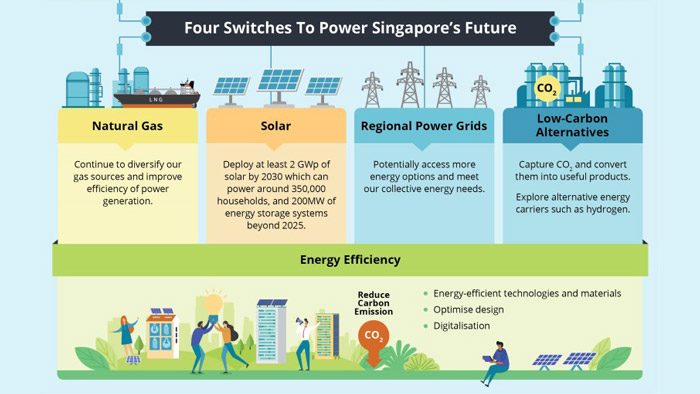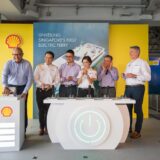
Singapore explores hydrogen as a low-carbon alternative
Five Singapore and two Japanese companies have entered into a Memorandum of Understanding (MoU) to study how hydrogen as a low-carbon alternative can contribute to a clean and sustainable energy future for Singapore.
Under the MOU, PSA Corporation Limited (PSA), Jurong Port Pte Ltd (Jurong Port), City Gas Pte Ltd, Sembcorp Industries Ltd, Singapore LNG Corporation Pte Ltd, Chiyoda Corporation (Chiyoda) and Mitsubishi Corporation (Mitsubishi) will develop ways to utilise hydrogen as a green energy source. This involves the research and development of technologies related to the importation, transportation and storage of hydrogen.
Working closely with Chiyoda, a key technology and supply chain solution partner, the companies will identify and demonstrate use cases using Chiyoda’s SPERA Hydrogen, Liquid Organic Hydrogen Carrier (LOHC) technology to allow hydrogen to be safely transported in chemical tankers at normal atmospheric temperature and pressure. Mitsubishi will support this development as the main shareholder of Chiyoda. The five Singapore companies will work closely with Chiyoda and Mitsubishi to evaluate the technical and commercial feasibility of hydrogen usage, to develop a business case for hydrogen import and utilisation in Singapore.
“We are delighted to be underlining PSA’s commitment to green initiatives with the signing of this MOU. Lowering carbon emissions to reduce the impact of climate change is a vital pillar of our business, and the direct impact of reducing our carbon footprint through this project is exciting. Powering our horizontal transport with hydrogen is just the beginning, and we will see its application expanding in the future, playing a part in our Smart Grid systems with EMA, and augmenting business adjacencies in our future Tuas Ecosystem.” saidOng Kim Pong, regional CEO, Southeast Asia, PSA International.
“Jurong Port is working with Chiyoda as we believe that the port is well placed to accelerate the development of hydrogen as a viable fuel option for power generation in Singapore’s transition to a low-emissions future,” said Ooi Boon Hoe, chief executive officer, Jurong Port.
“As the producer and retailer of piped town gas for more than 860,000 homes and businesses, City Gas believes in harnessing green energy and technology to support eco-conscious manufacturing and operations. We look forward to study and develop the viability of using green hydrogen in the town gas manufacturing process to further lower carbon emissions.” said Kenny Tan, chief executive officer, City Gas.
“Sembcorp has long held a strong commitment to sustainability and has made it central to our business strategy and operations. Sembcorp’s experience in the region as a provider of renewable energy and sustainability solutions, coupled with our deep technology integration know-how will greatly support the development of the hydrogen economy in Singapore. We look forward to this exciting partnership and developing more significant contributions to reducing Singapore’s carbon footprint,” said Neil McGregor, group president and CEO, Sembcorp Industries.
“This MOU marks an important first step towards making another sustainable energy option, namely hydrogen, available for Singapore. SLNG is pleased to be a part of this pioneering and very exciting collaboration, through seeking synergistic ways of using our terminal infrastructure. We are in the midst of a global energy transition, and SLNG is committed to doing what we can to facilitate and catalyse this process.” saidTan Soo Koong, CEO, SLNG.
Prompted by the very real challenge of climate change, the Singapore Government is engaging various stakeholders to co-create solutions for Singapore’s Energy Story.
The National Research Foundation (NRF) Singapore will also work with the Maritime and Port Authority of Singapore (MPA) to tackle the maritime decarbonisation challenge through research and technology development.
Professor Low Teck Seng, chief executive officer, NRF said: “Singapore needs to stay ahead in the research and development of alternative energy sources in our transition towards a low-carbon and low-emission economy. We are encouraged that companies are coming together, leveraging each other’s expertise, to study how hydrogen can be used as an emissions-free alternative to existing carbon sources. These companies will work alongside our researchers to look at how technologies in this area – such as catalysis and membrane technologies – can be further developed for the production and distribution of hydrogen. This effort will be supported by public sector agencies, to accelerate the potential use of hydrogen as a low-carbon solution that will reduce Singapore’s carbon footprint.












